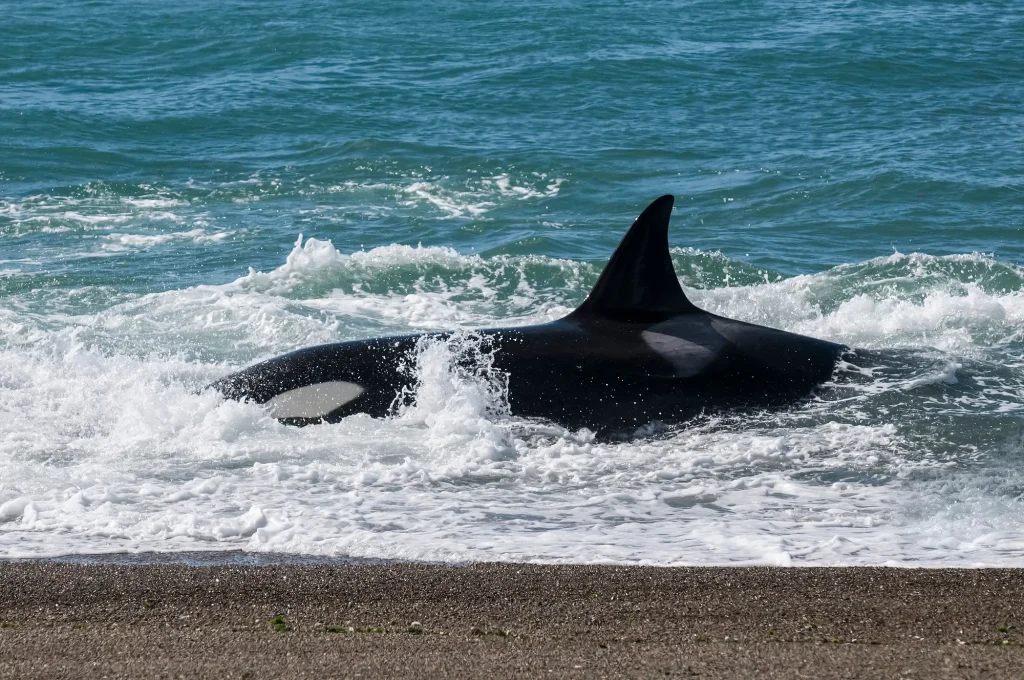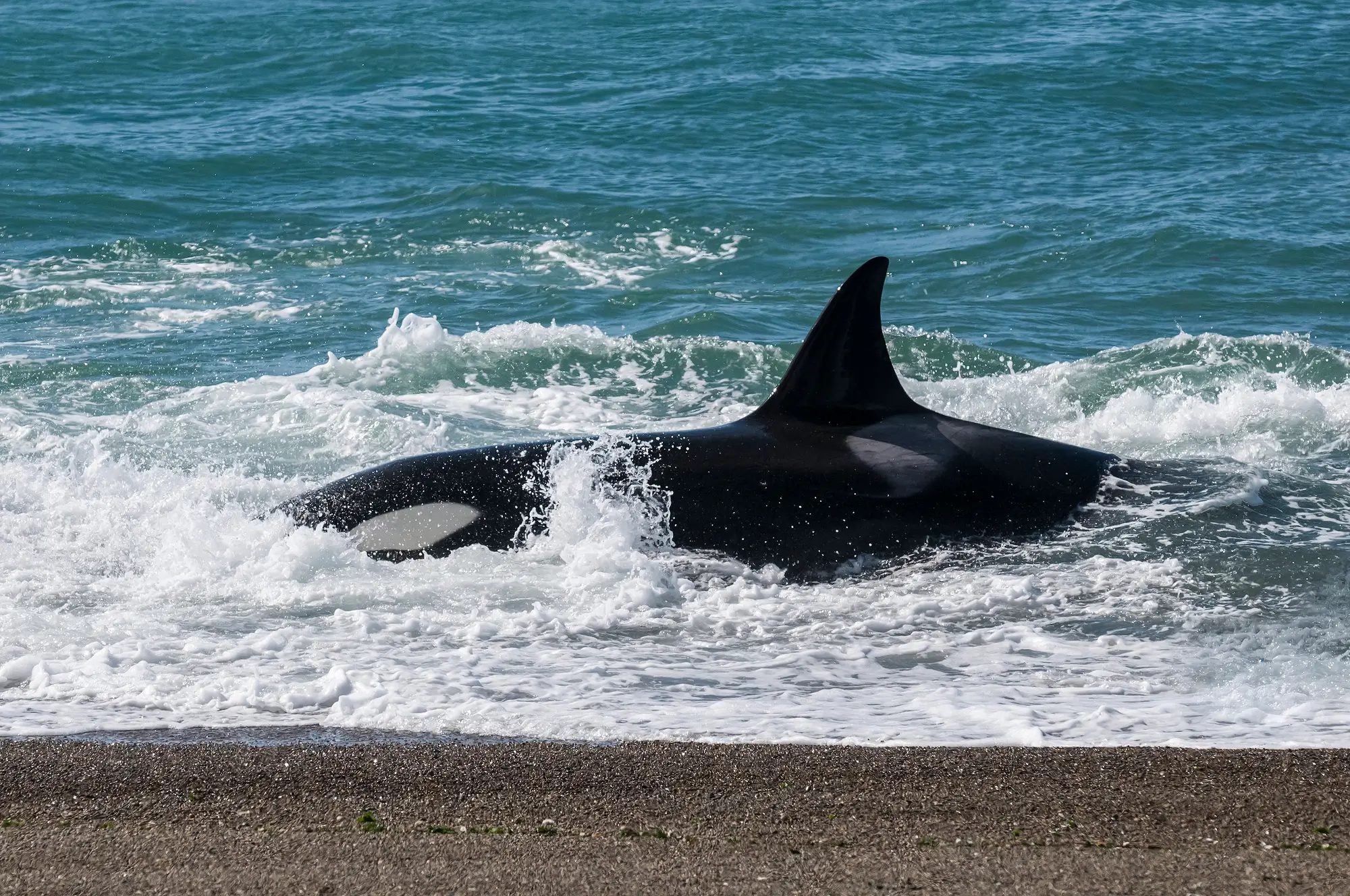Orcas vs. Sharks: Who Dominates the Ocean’s Food Chain?
Do orcas really kill sharks? New research reveals orcas actively hunt sharks, including great whites. Find out what it means for ocean life.

When you think of apex predators in the ocean, two creatures likely come to mind: sharks and orcas. Sharks, particularly great whites, have long been seen as the ultimate hunters, masters of the deep. But in recent years, a new player has been stealing the spotlight—orcas.
These highly intelligent and social marine mammals are not just acrobatic performers at marine parks; in the wild, they are fierce, strategic hunters. And it turns out, they’ve developed a taste for one of the ocean’s most feared predators—sharks.
But why do orcas hunt sharks? Do they eat them or just kill them? And do sharks stand any chance at fighting back? Let’s dive into the fascinating battle between these two apex predators.
Do Orcas Kill Sharks?
The short answer? Yes, absolutely.
While orcas (Orcinus orca) have always been known as powerful hunters, scientists only recently started documenting their attacks on sharks. In 2017, researchers in South Africa discovered several great white shark carcasses washed up on shore, all missing one thing—their livers.
At first, it was a mystery. What could be strong enough to take down a great white, yet precise enough to remove its liver with surgical precision?
The answer came from DNA analysis and eyewitness accounts: orcas were the culprits.
Orcas use specialized hunting techniques to kill sharks efficiently. The most remarkable one? Flipping them upside down. When a shark is turned onto its back, it goes into a state called tonic immobility—a kind of paralysis that leaves it defenseless. This trick allows orcas to disable sharks before taking what they want.
Do Orcas Eat Sharks or Just Kill Them?
Here’s where it gets even more interesting. Orcas don’t always eat the entire shark. Instead, they often target one specific part: the liver.
Why the liver? Because it’s packed with fat and nutrients, making it an incredibly rich energy source. Imagine a protein shake but for orcas—it’s full of oils, vitamins, and essential nutrients, providing them with an energy boost without the hassle of digesting tough shark cartilage and bones.
This behavior has been observed in multiple locations, from South Africa to California. In many cases, the shark’s body is left almost intact—except for a clean, almost surgical hole where the liver once was.
This behavior suggests that orcas aren’t just opportunistic; they’re incredibly selective and intelligent predators.
Do Sharks Ever Win Against Orcas?
Well, the odds are not in the sharks’ favor.
Orcas are larger, smarter, and hunt in packs. They communicate, plan, and work together, making them the ultimate predators of the ocean. In contrast, most sharks are solitary hunters, relying on instinct rather than strategy.
So, do sharks ever stand a chance? Not really.
There have been no documented cases of a shark successfully fighting off an orca. In fact, when orcas enter an area, sharks flee.
A study in 2019 found that great white sharks in South Africa completely abandoned their hunting grounds for months after orcas arrived. And it wasn’t just a temporary reaction—this shift in behavior lasted long-term.
It turns out sharks aren’t just losing the fight; they’re avoiding it altogether.
Lone Orca Kills a Great White Shark – A Game-Changer?
In a groundbreaking case published by Scientific American, researchers documented the first confirmed instance of a lone orca killing a great white shark. Previously, it was believed that orcas needed to hunt in pods to successfully take down large sharks, but this discovery changes everything.
A single orca, without assistance, was able to kill a great white. This raises a fascinating question: If just one orca can defeat a great white, what does that mean for the balance of power in the ocean?
This case also suggests that individual orcas can be specialized shark hunters, not just pods acting together. It reinforces the idea that orcas are not just powerful, but incredibly adaptive predators.
Orcas Are Eating Sharks in the Gulf of California—More Than We Thought
According to new research from Live Science, orcas are actively hunting bull sharks and blacktip sharks in the Gulf of California—and it may be happening far more frequently than we realize.
Between 2022 and 2023, scientists documented multiple predator-prey interactions between orcas and sharks in the protected marine area of Cabo Pulmo National Park, Mexico. This includes:
- Drone footage capturing two orcas hunting a blacktip shark, which barely escaped into deeper waters.
- Orcas working together to attack a bull shark, using tactics like charging and tail-slapping to stun it. In this case, the bull shark evaded capture by seeking refuge near a boat.
This suggests that orca predation on sharks isn’t rare—it may be a widespread and increasing trend.
Orcas Targeting Great Whites in Australia – A Global Trend?
The trend of orcas attacking sharks isn’t limited to South Africa and the Gulf of California. In 2024, researchers in Australia found DNA evidence of orcas attacking great white sharks.
A 4.7-meter (15-foot) great white shark was found near Portland, Victoria, with a massive bite wound containing killer whale DNA. This marks the first confirmed case of orcas preying on great whites in Australian waters.
This aligns with previous findings in South Africa, where orcas target only shark livers for their high nutritional value. These cases prove that orcas around the world are independently learning to hunt sharks.
How Is Orca Predation Changing Marine Ecosystems?
Orcas hunting sharks isn’t just a fascinating battle—it has huge ecological consequences.
Sharks play a critical role in maintaining healthy marine ecosystems by keeping other populations in check. When orcas remove them from an area, it can create a cascade effect—potentially changing the balance of species lower down the food chain.
For example:
- If great whites leave a hunting ground, their prey (e.g., seals or sea lions) may increase, altering the balance of the ecosystem.
- If orcas continue preying on sharks at high rates, shark populations may decline, impacting biodiversity.
It’s a powerful reminder that everything in the ocean is connected—and when one apex predator shifts its behavior, the entire system can change.
Do Orcas Attack Other Large Whales and Mammals?
Beyond preying on sharks, orcas have been documented attacking various large marine mammals, including other whale species.
Attacks on Baleen Whales
Orcas have been observed preying on baleen whales, particularly targeting calves and juveniles. In some instances, they also attack adult whales. For example, in 2019, orcas were recorded killing blue whales off the south coast of Western Australia, including an individual estimated to be 18 meters long. These coordinated attacks involve pods of orcas working together to exhaust and overwhelm their prey.
Predation on Sperm Whales
Sperm whales, despite their size, are not immune to orca attacks. Orcas have been known to target sperm whale calves and, occasionally, adults. Sperm whales often employ defensive strategies, such as forming protective circles with their flukes facing outward to deter orcas. However, these measures are not always successful against the coordinated efforts of orca pods.
Interactions with Humpback Whales
Humpback whales frequently encounter orcas, especially in regions where their ranges overlap. Orcas primarily target humpback calves, leading to defensive behaviors from adult humpbacks. There is also evidence that humpback whales will defend against or mob orcas who are attacking either humpback calves or juveniles as well as members of other species. This mobbing behavior may be an instinctual response to protect their young and possibly other marine mammals from predation.
Hunting Techniques and Social Coordination
Orcas utilize sophisticated hunting strategies, often involving social coordination and communication within the pod. They may employ tactics such as ramming, biting, and attempting to separate individuals from a group to isolate and exhaust their prey. These methods highlight the orcas’ intelligence and adaptability as top ocean predators.
Final Thoughts
So, do orcas kill sharks? Yes, they do.
Not only do they kill them, but they do so with incredible skill and precision, often targeting only the liver. Sharks, despite their fearsome reputation, seem to stand no chance against orcas, either fleeing the area or falling victim to their highly coordinated attacks.
This emerging understanding of orcas as shark hunters reshapes how we see the ocean’s top predators. While great whites have long held the title of ultimate marine predator, it turns out there’s an even bigger, smarter, and more dangerous hunter in town—the killer whale.
And as we continue to study their behavior, And as we continue to study their behavior, who knows what else we’ll discover about these remarkable ocean predators?
